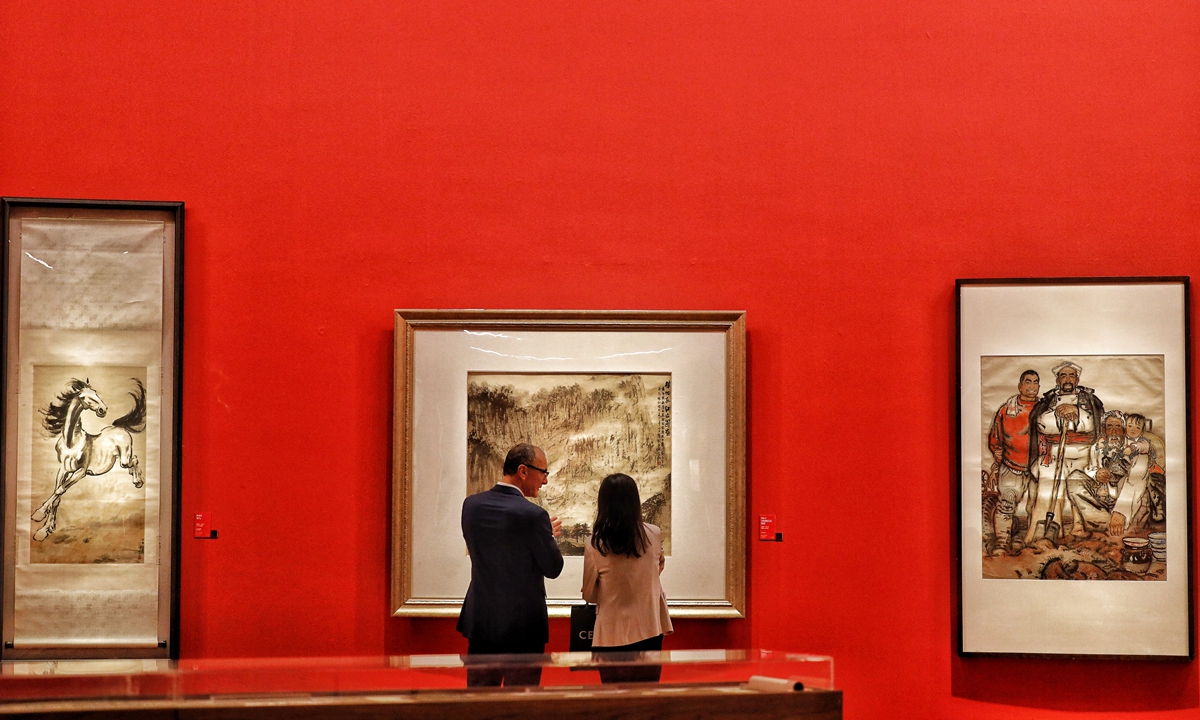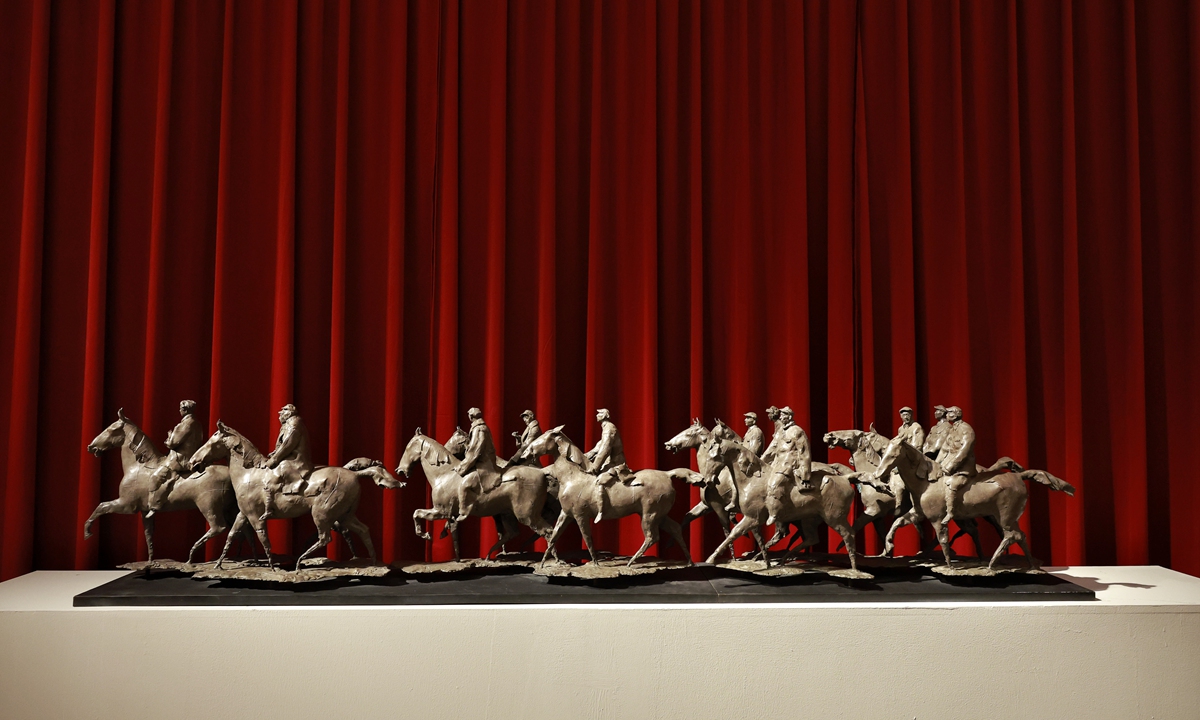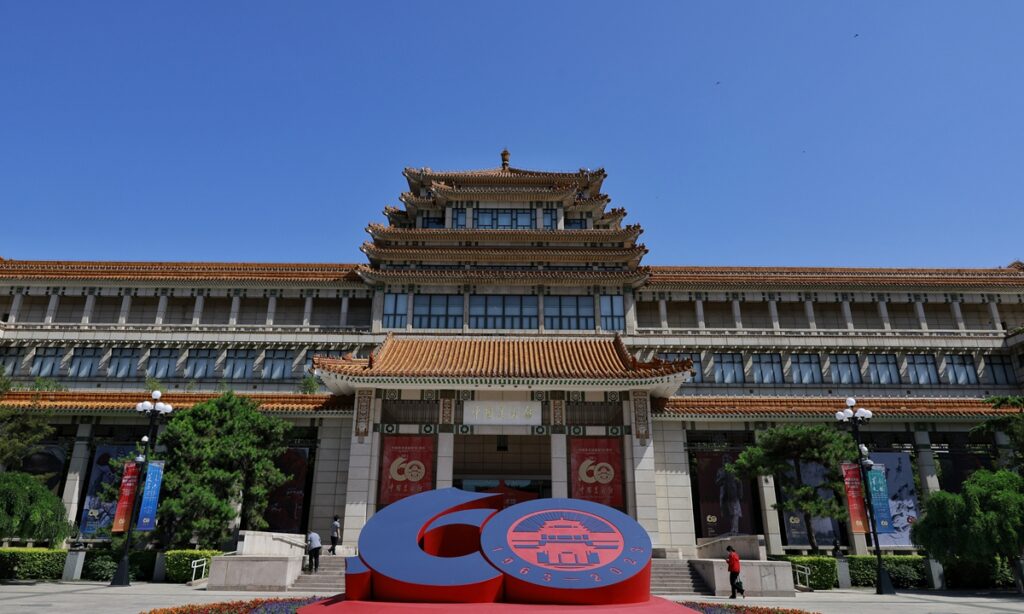60-year mission continues
Chinese President Xi Jinping has called on the National Art Museum of China (NAMOC) to develop itself into an art venue that enjoys worldwide prestige.
Xi, who is also general secretary of the Communist Party of China Central Committee and chairman of the Central Military Commission, made the call on Sunday in a reply letter to veteran experts and artists of the NAMOC.
Xi extended warm congratulations and sincere greetings to all members of the museum as it celebrates its 60th anniversary.
“The letter from Xi particularly moved us and made our hearts surge,” Wu Weishan, director of NAMOC, said at the opening ceremony of a new exhibition to mark the 60th anniversary on Tuesday.
“It highly affirms the achievements of NAMOC, which witnessed the vigorous development of China’s fine art industry. The museum has achieved positive results in establishing a high-quality collection, holding exhibitions, educating the public and taking part in cultural exchanges.”
In the letter, Xi said the NAMOC has witnessed the thriving development of art in new China. By upholding fundamental principles and breaking new ground, it has made notable achievements in collecting outstanding artworks, holding exhibitions, facilitating public education, and promoting international exchanges.
Xi expressed hope that the museum will strive to improve the quality of its collection, promote high-standard utilization of artworks, and provide better services. He called on the museum to develop itself into an art venue that enjoys worldwide prestige and to make greater contributions to the prosperity and development of Chinese fine arts, building cultural confidence and strength, and securing new successes in developing socialist culture.
The NAMOC, a national-level art gallery in China, was opened to the public on May 23, 1963. Recently, 13 veteran experts and artists of the NAMOC sent a joint letter to Xi, recounting the development of the museum and expressing their resolve to contribute to the high-quality development of art museums in the new era.

Visitors explore an exhibition to mark the 60th anniversary of the National Art Museum of China. Photo: Li Hao/Global Times
Classic and diverse
Since its opening, NAMOC has presented a diverse program of exhibitions and built a collection of over 130,000 objects, including representative works of Chinese art masters from ancient times to today. Among the treasures on display are seminal works that have shaped Chinese art history, as well as nearly 4,000 international artworks, a considerable portion of which are classic works in modern and contemporary art history both at home and abroad.
To give more people access to these precious works, the museum is hosting a new exhibition series titled Beauty in the New Era, which showcases its classic collections and its commitment to preserving China’s cultural traditions through exhibitions and research.
Nearly 600 artworks will be displayed at the museum in four sections: Ink Splendor and Cultural Context: Exhibition of Bada Shanren, Shi Tao and Chinese Xieyi Art since the 20th Century, A Tribute to the Classics: An Exhibition of Fine Arts from the Collection of NAMOC, Majestic Baota Mountain and Yanhe River: Art Exhibition with Ode to Spirit of the Long March and Spirit of Yan’an and Prosperity in Diversity: Collection of International Artworks from NAMOC (II).
According to Wu, the exhibition displays the classic works of art collected by NAMOC and vividly embodies the innovation and development of China’s excellent traditional culture, the promotion and inheritance of red revolutionary culture, and the exchange and mutual learning of outstanding Chinese and foreign art achievements.
More than 100 masterpieces by Chinese masters including Su Shi, Tang Yin, Qi Baishi, Xu Beihong, Lin Fengmian, Liu Haisu, and Pan Tianshou, as well as foreign masters such as Picasso, Kollwitz and Ansel Adams from NAMOC’s collection are on display.
As an important hub for international art exchanges, NAMOC has always attached great importance to the collection, research, and display of international artworks since its establishment.
“Our museum has hosted various exhibitions for overseas artists from countries like Italy and France, especially those from Academy of Fine Arts at the Institute of France,” Wu told the Global Times in an earlier interview.
“They were very touched by the exhibition and donated their masterpieces to us. Before coming to China, they, mostly in their 80s and 90s, knew very little about China. But after the exhibition, they admired China and were moved by the respect and exchanges.”
For Fan Di’an, chairman of the China Artists Association and head of NAMOC from 2005 to 2014, the museum has housed works from generations of Chinese artists, shouldered the task of public art education as well as offered a stage for international artists to “talk and learn from each other, all of which demonstrate our cultural confidence.”
“The reply letter from President Xi was not just for veteran experts and artists at NAMOC, but for the whole art circle. We must further implement his call and make new achievements in Chinese fine art,” Fan told the Global Times on Tuesday.

An artwork on display at the National Art Museum of China Photo: Li Hao/Global Times
More celebrations
A stamp was also issued on Tuesday as part of the museum’s 60th anniversary celebrations.
The stamp features the five Chinese characters that make up NAMOC’s Chinese name written in calligraphic script originally from the brush of late Chinese leader Mao Zedong. It also shows the museum’s main building, with a design that incorporates elements of traditional Chinese architecture – a storied pavilion and a roof of yellow glazed tiles.
Through these celebrations, the museum hopes to showcase that “China’s long culture and red revolutionary culture have merged into a journey of the new era and a stream rushing to the ocean that is human civilization,” said Wu.
(Global Times)




